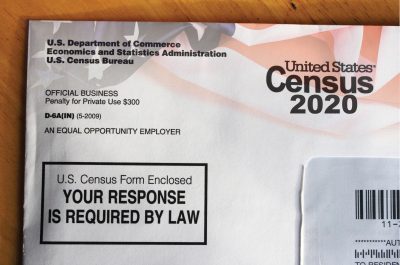Due Process and the Courts
What does the constitution say about due process?
The Fifth Amendment to the Constitution says clearly that no person shall be deprived of life, liberty, or property without the due process of law. Note that this says person, not citizen, and over the years the Supreme Court has consistently ruled that the Due Process Clause applies to all people in the United States.Do non-citizens have the right to due process in the U.S.?
Yes. The Constitution guarantees due process rights to all "persons," not just citizens. This means non-citizens, including undocumented immigrants, are entitled to fair treatment under the law. This includes the right to defend themselves in court. But recent Trump administration policies that speed up deportations and limit access to legal representation make it harder for non-citizens to get their fair day in court.- Access to legal representation Access to legal counsel is an essential part of our justice system and our democracy. In the criminal justice system, anyone facing even one day in jail gets a lawyer if they can't afford one. But immigrants facing deportation usually don't get that chance.The research is clear – the most effective way to ensure some level of due process for people navigating our complicated immigration system is for them to have trained attorney at their side. But Trump administration is now working to strip attorneys from as many people as possible, all in the name of increasing its deportation numbers. This attempt to eliminate basic due process will hurt people who already have few options.
- Fair day in court Due process guarantees that individuals have the opportunity to defend themselves in court. This includes non-citizens facing deportation.
Why is due process important?
We are seeing right now the importance of due process when it comes to President Trump's actions to carry out the so-called Alien Enemies Act, a 1798 wartime law that permits people to be deported outside of the normal framework of immigration law. President Trump has alleged that this law allows him to simply point at any person, declare them to be an alien enemy, and kick them out of the country without ever having a chance to see a judge. Thankfully, the Supreme Court said that is not true, and in a unanimous decision, ruled that people can challenge the Trump administration's invocation of the Alien Enemies Act. That is why due process is so important, because it means that no person can be rounded up and sent to another country without a chance to go to court and make the government prove their case.How is the American Immigration Council working to protect due process?
- We serve thousands of individuals in immigration detention centers through the Immigration Justice Campaign, our initiative with the American Immigration Lawyers Association. The Justice Campaign provides free legal services for immigrants who would otherwise have to navigate our complicated immigration system without a lawyer.
- We use the courts to demand a fair process for immigrants. Our litigation team is fighting back against the Trump administration’s blatant disregard for due process including filing a lawsuit challenging their illegal detention of immigrants in El Salvador’s notorious Terrorism Confinement Center (CECOT).

Advocates Seek Information About a Secretive Program That Fast-Tracks Deportations
Since the mid-1980s, immigration courts have operated the Institutional Hearing Program (IHP). The program is designed to quickly deport people serving criminal sentences. Despite how long it’s been in operation, little is known about the IHP. With a lawsuit filed earlier this week, advocates hope to shed light… Read More

Lawsuit Seeks Clarity on How Immigrants Serving Time Are Deported From The United States
The American Immigration Council, American Immigration Lawyers Association, and Immigrant Defense Project filed a lawsuit Wednesday in federal court to compel the government to release records and data about the Department of Justice’s Institutional Hearing Program, an obscure program that expedites the deportation of immigrants who are serving time for criminal offenses. The lawsuit seeks to understand how the IHP operates, where it operates, and who it targets. Read More

The Institutional Hearing Program: An Overview
The Institutional Hearing Program permits immigration judges to conduct removal proceedings for noncitizens serving criminal sentences in certain correctional facilities. Read More

Census Bureau Asked 250,000 Households About Their Citizenship Status, Despite Court Ruling
Despite losing at the Supreme Court, the Trump administration still managed to ask nearly a quarter of a million U.S. households about the citizenship status of their household members. That’s because the administration had already started mailing out its 2019 Census Test—a nationwide test used to inform the upcoming 2020… Read More

FOIA Lawsuit Demands Release of Information on the Institutional Hearing Program
This FOIA lawsuit sought information from the EOIR on the Institutional Hearing Program (IHP), which it runs jointly with ICE and the Bureau of Prisons (BOP). Read More

FOIA Request on EOIR Institutional Hearing Program
The Council, along with AILA and the Immigrant Defense Project (IDP) filed a Freedom of Information Act (FOIA) request with the Executive Office for Immigration Review (EOIR) seeking information relating to the Institutional Hearing Program (IHP). Read More

FOIA Request Seeks All Immigration Judge Standing Orders
The Council filed a Freedom of Information Act (FOIA) request with the Executive Office for Immigration Review (EOIR) seeking all immigration judge written standing orders presently in force at immigration courts nationwide governing requests by counsel. Read More

Cutting Interpreters From Immigration Court Risks Due Process
Every day, hundreds of non-English speaking immigrants show up to court for initial hearings where they will see an immigration judge for the first time. But due to a new policy, many immigrants will lose the help of dedicated court interpreters to ensure they understand what’s going on in the… Read More

A New EOIR Rule Expands Powers of the Board of Immigration Appeals and Attorney General
The Executive Office for Immigration Review (EOIR) issued a final rule last week that expands the authority of the Board of Immigration Appeals (BIA) and Attorney General William Barr when reviewing an immigration judge’s decision following a removal proceeding. The BIA reviews an immigration judge’s decision if ether the individual… Read More

Certain Detained Asylum Seekers Must Receive a Bond Hearing Within 7 Days, Despite Trump Administration’s Efforts
Attorney General William Barr announced in April 2019 plans to eliminate bond hearings for immigrants who pass an asylum screening interview after entering the United States. This would have forced many people to remain incarcerated for months or years during their asylum proceedings. However, on Tuesday, a federal court recognized… Read More
Make a contribution
Make a direct impact on the lives of immigrants.
